 Petzlover
Petzlover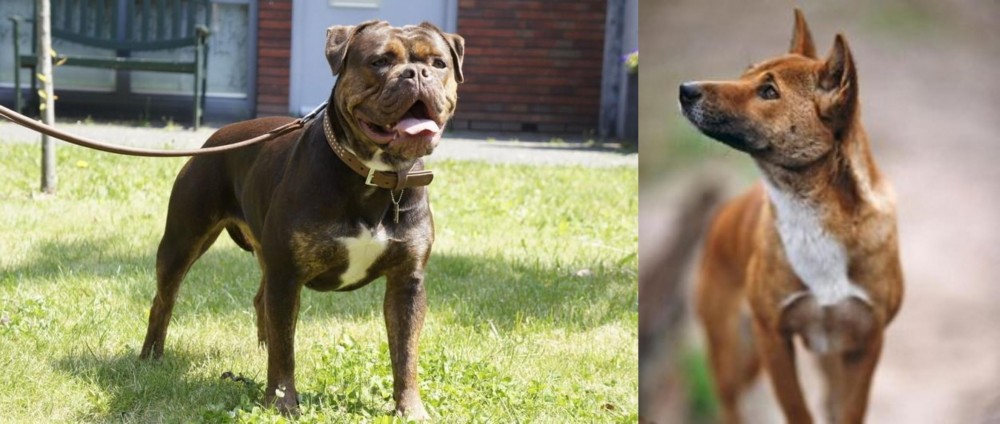 Renascence Bulldogge is originated from United States but New Guinea Singing Dog is originated from Papua New Guinea. Renascence Bulldogge may grow 18 cm / 8 inches higher than New Guinea Singing Dog. Renascence Bulldogge may weigh 26 kg / 58 pounds more than New Guinea Singing Dog. Renascence Bulldogge may live 5 years less than New Guinea Singing Dog. Both Renascence Bulldogge and New Guinea Singing Dog has almost same litter size. Renascence Bulldogge requires Low Maintenance. But New Guinea Singing Dog requires Moderate Maintenance
Renascence Bulldogge is originated from United States but New Guinea Singing Dog is originated from Papua New Guinea. Renascence Bulldogge may grow 18 cm / 8 inches higher than New Guinea Singing Dog. Renascence Bulldogge may weigh 26 kg / 58 pounds more than New Guinea Singing Dog. Renascence Bulldogge may live 5 years less than New Guinea Singing Dog. Both Renascence Bulldogge and New Guinea Singing Dog has almost same litter size. Renascence Bulldogge requires Low Maintenance. But New Guinea Singing Dog requires Moderate Maintenance
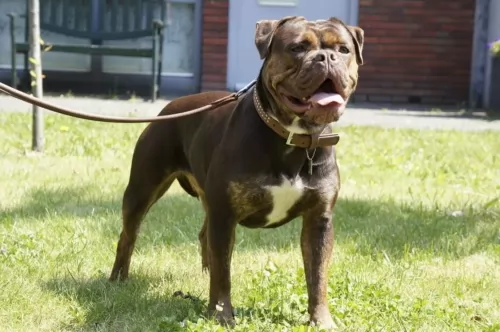 The Renascence Bulldogge, sometimes referred to as the Gargoyle – or Guardian bulldogs, came about by crossing the American Bulldogs with Bullmastiffs, Bandogges, English Bulldogs and Hermes Bulldogges.
The Renascence Bulldogge, sometimes referred to as the Gargoyle – or Guardian bulldogs, came about by crossing the American Bulldogs with Bullmastiffs, Bandogges, English Bulldogs and Hermes Bulldogges.
The idea was to re-create the working British Bulldogge breed of the 1800's. The Renascence Bulldogge is bred to a standard and is a rare dog. The idea was to bring about a dog like the English Bulldog but with less health problems.
There is a Renascence Bulldogge Kennel Club in existence.
 In 1957 the New Guinea Singing Dog was “discovered” in the Highlands of Papua New Guinea and he is found no where else. There is a lot of debate among scientists, taxonomists and biologist as to what is really a species and what is a subspecies. When the NGSD was found he was classified as a new canid species then in 2007 they were downgraded to a subspecies.
In 1957 the New Guinea Singing Dog was “discovered” in the Highlands of Papua New Guinea and he is found no where else. There is a lot of debate among scientists, taxonomists and biologist as to what is really a species and what is a subspecies. When the NGSD was found he was classified as a new canid species then in 2007 they were downgraded to a subspecies.
Today the NGSD is considered to be a wild dog and a primitive dog. They have lived in Papua New Guinea in the Highlands for thousands of years. They are closely related to other wild dogs, such as Australia’s dingo. They are today as they were a thousand years ago – wild. So wild that many counties have them in their zoos.
With the right care and enough socialization, they do very well as companion animals living with people. They are difficult to domesticate however and the person who owns one should be a part of the NGSD community in order to get support, share issues, and learn from others who have lived with these “wild dogs” for many years.
Any New Guinea Singing Dog found in North America or Europe is a direct descendent of two couples that were taken to zoos in China and Australia. The NGSD makes a howling sound that modulates and undulates through a wide series of tones. No other dog makes this musical sound. Rare even in New Guinea today, the Singer is thought to be the rarest of all dogs.
The only organization that recognizes the Singing Dog is the UKC and they are allowed in UKC competition. The NGSD now holds the classification of a domestic dog – a Canis lupus dingo - which is a subspecies of Canis lupus. In 2016 a group of 15 wild dogs were photographed for the first time ever. Prior to this the NGSD were never seen in more than pairs.
It is believed that they do not live and operate in packs, but rather solitary, pairs or family groups where both the parents do the work of raising the pups.
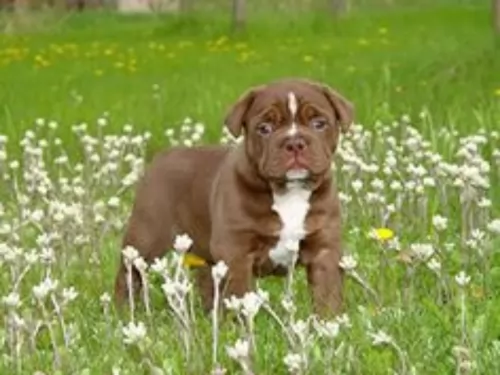 The Renascence Bulldogge is a well proportioned, muscular, medium sized dog with a large head and strong neck.
The Renascence Bulldogge is a well proportioned, muscular, medium sized dog with a large head and strong neck.
He can weigh between 27 to 41 kilograms and stand at between 43 and 56cm. A dock tailed is the preferred look, giving the dog a nice compact, distinguished look, but these days the tail is left to grow long. The coat is short and smooth and the colors are fawn, white and black. The eyes of the dog are low and wide, the muzzle broad and the ears are high set and semi-erect, semi-floppy. The back legs are muscular and heavy, quite a bit longer than the front legs.
Protective and territorial, the Renascence Bulldogge happens to also be a friendly, social, playful dog wih his human family. He tends to be a bit reserved and wary around strangers.
This powerful Molosser is also easy to train, and with training and socialization he becomes a pleasure to have around – obedient and well mannered.
 The New Guinea Singing Dog is a medium sized dog with short legs and a broad head. They are about average height and they are very limber and flexible. They can rotate their paws and spread their legs at much greater angles than the average canine. Thus, they can easily climb a tree. They can jump like a cat.
The New Guinea Singing Dog is a medium sized dog with short legs and a broad head. They are about average height and they are very limber and flexible. They can rotate their paws and spread their legs at much greater angles than the average canine. Thus, they can easily climb a tree. They can jump like a cat.
They have very reflective eyes that are shaped like almonds and have dark rims. The color of the eye can be dark brown to dark amber. It is also believed that they can see better than other domestic dogs in low light settings. Their pupils let in more light due to pupils that are wider than most other dogs.
The ears of the NGSD are lined with fur, pointed and erect. The are forward laying and can be rotated in order to hear even the farthest and faintest of sounds. There are dark guard hairs on the spine and back of the ears and tail. On young dogs the muzzle is black but by age 7 it is already beginning to turn gray.
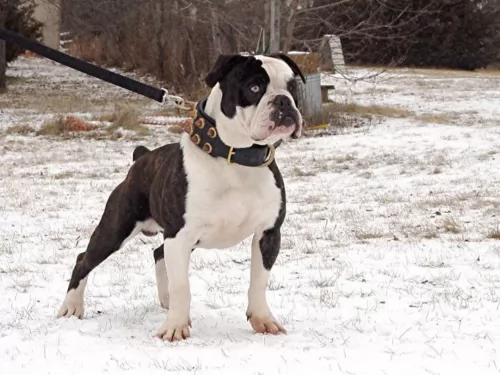 The Renascence Bulldogge is a rare dog and they are now being bred more often by people who love the English Bulldog but who don't want so many health problems.
The Renascence Bulldogge is a rare dog and they are now being bred more often by people who love the English Bulldog but who don't want so many health problems.
The Renaissance Bulldog is a lot more healthier and more robust than the English Bulldog. The best part is that he has the English Bulldog's characteristic look. Bring him into your home and you’ll have an entertaining, social, playful, loving pet and companion.
 They could be, but it must be remembered that this is a wild dog.
They could be, but it must be remembered that this is a wild dog.
Varying the pitches when howling
It’s possible but not recommended. Leave them wild.
Highly intelligent but trainability is questionable unless well socialize and attached to their people.
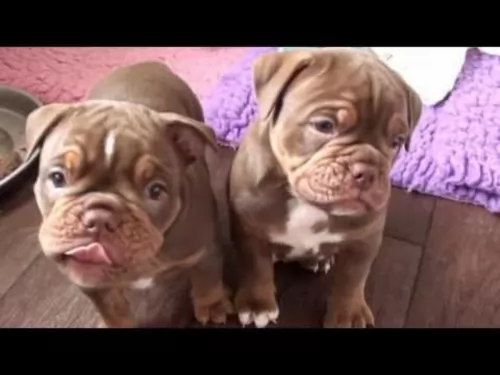 Your Renascence Bulldogge can live to be anything from 10 to 15 years of age with good care.
Your Renascence Bulldogge can live to be anything from 10 to 15 years of age with good care.
Heat stroke is a concern with the Renascence Bulldogge, and even with his daily walk, you will have to keep an eye on him You must never ever leave him alone in a hot car. These dogs have breathing problems as it is and overheating can kill him.Suffering from heatstroke is regarded as an emergency situation.
Any dog can suffer with bloat, not only the Renascence Bulldog. If your dog’s stomach is bloated, he will have a hard, swollen stomach, he will be restless and trying to vomit. This is also a life threatening condition.
Also referred to as canine atopic dermatitis, the Renascence Bulldog sometimes has to contend with this non-parasitic infection. Your poor dog will have dry, itchy skin and he can become frantic with this. You will need to get him to the vet.
Other things to look out for with your Bulldogge are hip dysplasia, cancer and eye infections.
 Though the breed is not extinct – it is so wild and secretive that there is no history or record of any health problems. However, the small number of domestic companion animals have shown health issues in recent years.
Though the breed is not extinct – it is so wild and secretive that there is no history or record of any health problems. However, the small number of domestic companion animals have shown health issues in recent years.
Pancreatitis – can be chronic or acute. If chronic it needs to be treated and diet changed. If acute it is usually deadly.
Hip Dysplasia – can cause lameness or arthritis.
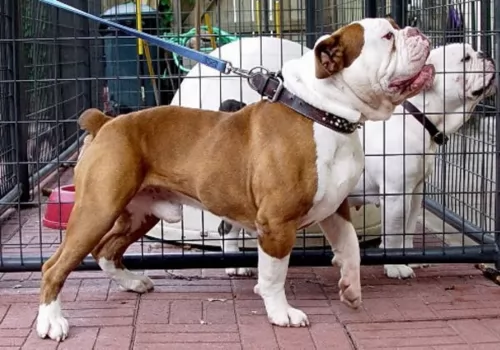 Your Renascence Bulldogge is a special, loving pet, but keeping him healthy can be a bit of a challenge.
Your Renascence Bulldogge is a special, loving pet, but keeping him healthy can be a bit of a challenge.
A walk every day will be a good form of exercise for this dog.
Your pet is one of these dogs that has quite a few layers around the face.You will need to wipe between these folds with a damp,warm cloth or with a natural,gentle anti-fungal wipe.
His skin can become irritated with the layers of skin and you don’t want such a cute pet to battle with a itchy rash on his skin.
Your Renascence Bulldogge is going to need the very best food you can give him. The commercially manufactured foods are nice and convenient and the best ones are well balanced.
It’s nice to be able to give your Bulldogge some delicious home-made food, bearing in mind that dogs like simplicity and consistency.
Boiled chicken, brown rice or pasta and sweet potatoes, spinach and carrots all chopped up and added to your dog’s dry kibble twice a week will delight him. It will ensure he is healthy ad happy. A little bit of raw meat can also do wonders for his health. Never leave him without a constant supply of fresh, cool water.
 In the wild both pups and adults are thought to eat small mammals and birds as well as fruits. In homes feed a high protein diet. Because of the tendency toward pancreatitis do not feed raw or under cooked meat. If feeding meet do so in small amounts well cooked, very lean. Stay away from the fat. Feed puppies very small amounts. ¾-1 cup high quality dry puppy food twice a day.
In the wild both pups and adults are thought to eat small mammals and birds as well as fruits. In homes feed a high protein diet. Because of the tendency toward pancreatitis do not feed raw or under cooked meat. If feeding meet do so in small amounts well cooked, very lean. Stay away from the fat. Feed puppies very small amounts. ¾-1 cup high quality dry puppy food twice a day.
Same as the puppy when it comes to meat although you could give the adult a little more. 1 ½ cups od high quality medium breed dog food twice a day.
In the wild there is no indication of health issue. A very healthy breed.
The NGSD needs a lot of stimulation both mental and physical. They must have a daily walk and somewhere to run. They are escape artist in homes. Remember they can jump like cats and climb trees. If their head can pass through a hole, so can the rest of their body.